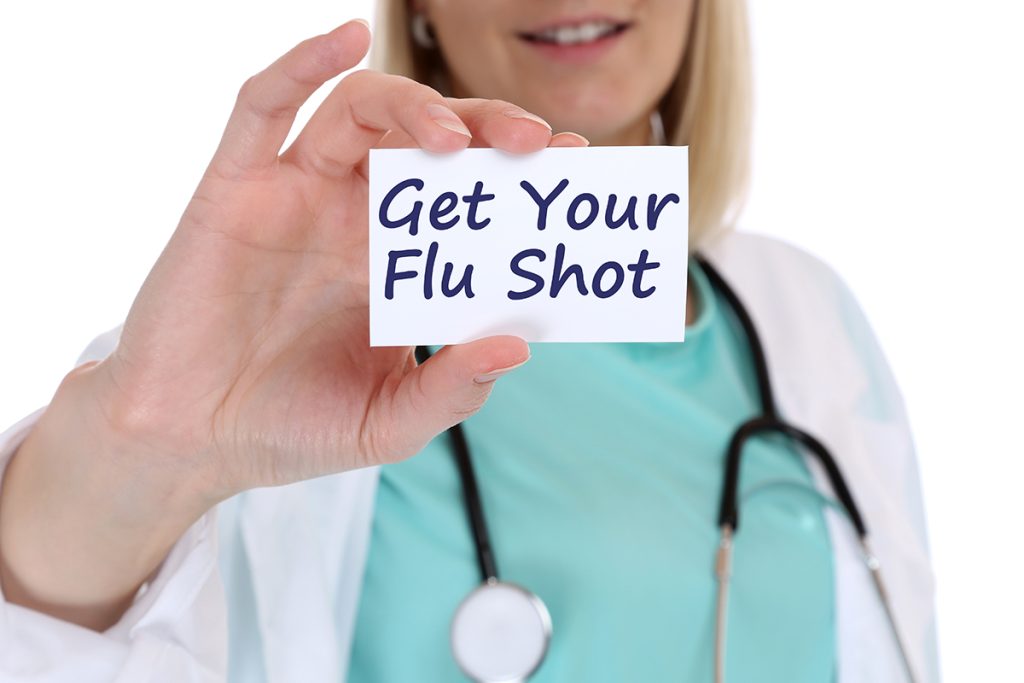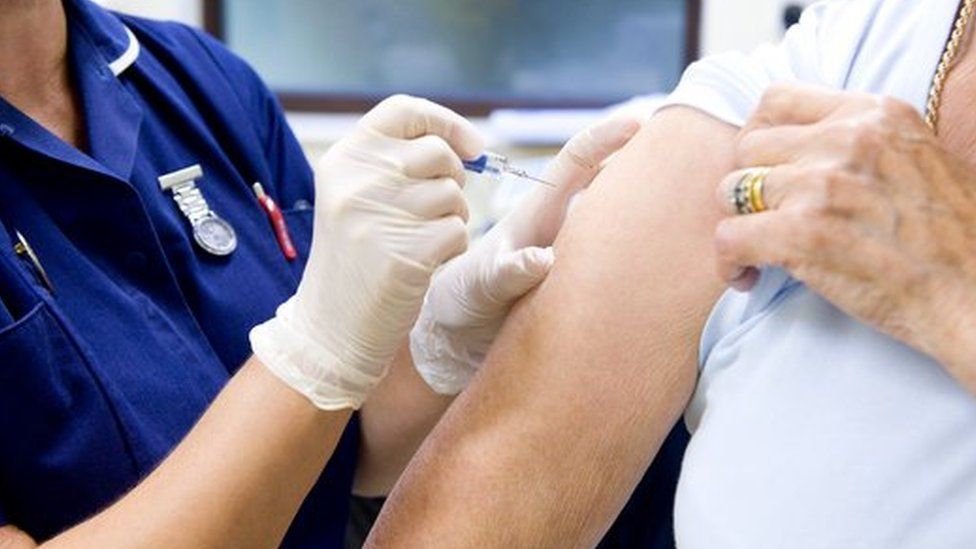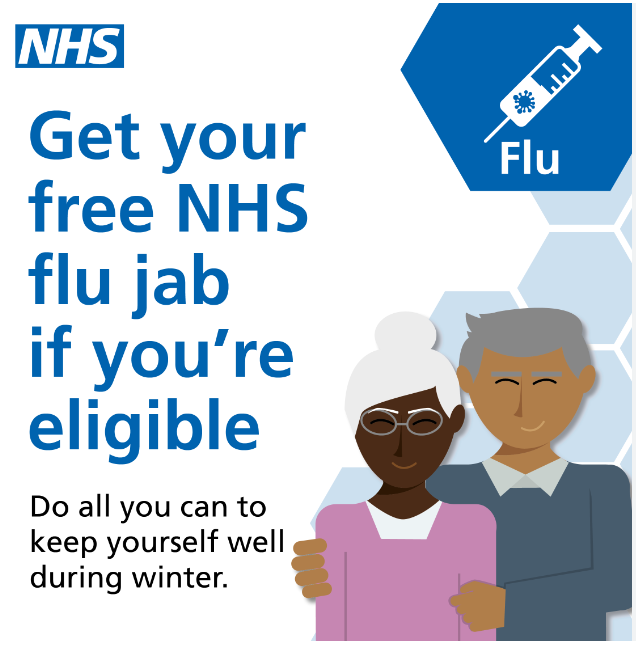
Did you know that your flu jab may also be viewed as a preventive intervention for stroke?
It’s recommended to book in to have your flu vaccination in the autumn, toward early winter – before flu rates increase – so, around now. Getting the flu vaccine has been indicated in a number of large-scale meta-analyses to date (three described below) to lower the risk of stroke by over 12% in all adult populations.
The vaccine has a low usage rate overall, especially in younger adults (those under 50). Many people think… ‘oh, it’s just the flu, it’s fine’. But the flu can be a devastating disease. Once people understand that having flu raises the risk for heart problems (which is why it’s strongly recommended for people with heart disease) and stroke (and the flu vaccine significantly decreases the risk of both), this may change their view so that they are more willing to get a routine flu vaccine.
It’s long been known that respiratory infections increase the risk of stroke in the days following infection. Acute systemic inflammation may drive the relationship between flu and stroke (possibly through endothelial dysfunction, atherosclerotic plaque instability, and a procoagulant state).
So, can getting the jab really can be a case of ‘two for the price of one’? Greater protection from flu and stroke at the same time?

In meta-analyses of observational studies, individuals who received the influenza vaccine have been found to be less likely to have a stroke, and it’s important to note that a caveat is that unavoidably, studies have been heterogenous, relatively small, and potentially limited by biases. Hence no global recommendations may yet be made; research is still being collected on whether getting the flu vaccine can definitely help protect against a stroke.
But to be able to reduce your risk of stroke by taking such a simple action is very compelling. Let’s look further…
A large scale study reported in the Lancet (November 2022) the statistics of over 4 million adults (over 18) in Alberta, Canada (4,141 209 adult individuals with a total observation time of 29,687 899 person-years) revealed that the risk of stroke is reduced among people who had recently been vaccinated against influenza compared with those who had not. Further, that this association extended to the entire adult population and was not limited to individuals with a baseline high risk of stroke. Vaccination was associated with a reduced risk of stroke in both men and women, but the magnitude of benefit was larger in men than women, perhaps because unvaccinated men had a significantly higher baseline hazard of stroke than did unvaccinated women.
Based on an analysis of comprehensive data from the entire population of a province of Canada, the analysis showed a clear and clinically relevant association between recent vaccination against influenza and a reduction in the hazard of stroke compared with no recent vaccination. This association was present across all stroke types, and extended to the entire adult population and was not limited to people at high risk of stroke.
 Another analysis reported in Neurology (September 2022) indicated a similar finding: statistics (14,322 people who had a stroke and 71,610 people who did not have a stroke) from a primary care database in Spain from 2001–2015 showed that those who had the flu jab were 12% less likely to have a stroke than those who did not (adjusted for the following factors). The reason isn’t fully clear, although the authors of the study suspect vaccinations may have an anti-inflammatory effect.
Another analysis reported in Neurology (September 2022) indicated a similar finding: statistics (14,322 people who had a stroke and 71,610 people who did not have a stroke) from a primary care database in Spain from 2001–2015 showed that those who had the flu jab were 12% less likely to have a stroke than those who did not (adjusted for the following factors). The reason isn’t fully clear, although the authors of the study suspect vaccinations may have an anti-inflammatory effect.
The researchers looked at whether people had received the influenza vaccine at least 14 days before the stroke or before that same date for those who did not have a stroke. A total of 41.4% of those who had a stroke had received the flu shot, compared to 40.5% of those who did not have a stroke. But the people who got the shot were more likely to be older and to have other conditions such as high blood pressure and high cholesterol that would make them more likely to have a stroke.
Since the study was observational, it does not prove that getting the flu shot reduces the risk of stroke. It only shows an association. There could be other factors that were not measured that could affect the risk of stroke. For example, there may be unmeasured or unknown factors such as those related patient healthy habits (e.g., diet, exercise, better adherence to treatments) that can be associated with vaccination and, at the same time, may lower the risk of having a stroke.
A worldwide systematic review reported in BioMed Research International (February 2023) reported a meta-analysis conducted on the RCTs, cross-sectional, case-control, or cohort studies that examine the association between receiving jabs and the occurrence of stroke and its hospitalisation in the elderly (between 3,198,646 participants from 1995 to 2021).
 The analysis was limited in many ways: for example. the highest number of studies conducted to date have been in Asia, Europe, and North America, and no studies have been reported from Africa, South America, and Australia, so this problem adversely affected the generalisability of the study results. Nevertheless, the results of this large-scale meta-analysis show that, compared to the elderly who did not receive the flu vaccine, the odds of having a stroke after elderly people received the flu vaccine decreased by 16% (10%-22%), which is statistically significant.
The analysis was limited in many ways: for example. the highest number of studies conducted to date have been in Asia, Europe, and North America, and no studies have been reported from Africa, South America, and Australia, so this problem adversely affected the generalisability of the study results. Nevertheless, the results of this large-scale meta-analysis show that, compared to the elderly who did not receive the flu vaccine, the odds of having a stroke after elderly people received the flu vaccine decreased by 16% (10%-22%), which is statistically significant.
The jab is free on the NHS to those who are eligible. If you are not eligible, you can still pay to get it from some supermarkets or high street pharmacies: it typically costs £10 to £20, depending on where you get it from.
Even if you were vaccinated last year, it is important to get your jab again this flu season because the viruses can change year to year and protection decreases over time. The best defence is to get your vaccine before the virus starts circulating.
Please read this factsheet from the British Heart Foundation





